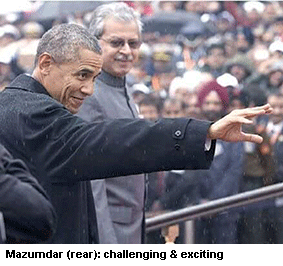In 2016, 1.1 million graduates wrote the UPSC civil services exam — the qualifying exam for entry into the civil services, including the IFS Paromita Sengupta
 Despite the glamour of new careers in business and academia, the Indian Civil Service continues to attract lakhs of applicants every year. In 2016, 1.1 million college/university graduates wrote the civil services examination conducted by the Union Public Services Commission (UPSC) — the qualifying exam for entry into the civil services, including the Indian Foreign Service (IFS).
Despite the glamour of new careers in business and academia, the Indian Civil Service continues to attract lakhs of applicants every year. In 2016, 1.1 million college/university graduates wrote the civil services examination conducted by the Union Public Services Commission (UPSC) — the qualifying exam for entry into the civil services, including the Indian Foreign Service (IFS).
Graduates in the 21-32 years age group are eligible to write this exam with each candidate allowed a maximum of six attempts. The examination is held in two phases — a preliminary objective-type exam and the main exam. Students who clear the prelim — a general studies and aptitude test held in 72 centres countrywide every August — qualify to write the main exam held in December.
The main examination requires candidates to write nine essay-type papers testing their knowledge of one Indian language, English, general studies and any two subjects selected from a prescribed list. Candidates who clear the main exam are administered a personality test and interviewed by a UPSC board panel. Marks obtained by candidates in the main exam and interview determine their final ranking. The selection process is rigorous. The average number of candidates selected by UPSC is a mere 1,000 per year
Based on their ranking, candidates — who are required to indicate their preferred service cadre (administrative, foreign, revenue, police etc) in descending order — are slotted into the first, second or third service of their choice. Although in the immediate aftermath of independence IFS was the first choice of UPSC-selected civil servants, since the 1970s top rankers prefer to join the IAS cadre. Nevertheless the IFS is a prestigious service for youth aspiring to serve the nation.
Pay & Progression
Once selected, IFS recruits together with their counterparts selected for IAS and other Central services are required to undergo training for four months at the Lal Bahadur Shastri National Academy of Administration, Mussoorie, where they are provided basic grounding in economics, history, political science, public administration and Indian languages.
Subsequently, IFS trainee officers are admitted into the Foreign Service Institute, New Delhi where they are schooled in foreign policy, economic and trade issues, cultural diplomacy etc for 18 months. This training is followed by a six-month attachment with a division in the Union ministry of external affairs (MEA), Delhi, after which they are designated assistant secretary.
The first posting of an IFS officer is usually in an embassy abroad as a third secretary and language trainee. As such, IFS officers are required to thoroughly learn a foreign language for a period of up to two years. On clearing the foreign language qualifying exam, the officers are confirmed and posted as Second Secretary in an embassy or as under secretary in MEA. After seven years, officers progress to the office of First Secretary/Counsellor (13 years), and Minister (18 years). Ambassadors are appointed from the ranks of Minister (joint secretaries and above in the MEA) or from among senior counsellors.
While posted in the MEA, Delhi, IFS officers’ remuneration is on a par with the IAS cadre. However, when posted abroad, additional foreign allowance is paid to compensate for cost of living differences. The starting salary of an IFS officer is Rs.65,000 plus allowances per month which can go up to Rs.225,000 plus allowances.
Professional profile
“Apart from the joy of discovering a new country every three years and enjoying the privilege of representing India, the variety of work — ranging from political and economic to socio-cultural diplomacy — which IFS officers engage in at missions/embassies and within the MEA, is challenging and exciting. It requires sharp skills of negotiation, consultation, diplomacy and persuasion,” says Jaideep Mazumdar, currently joint secretary in the MEA assigned to the South-east Asia, Australia, New Zealand and Pacific desk. A suave, seasoned and experienced diplomat, Mazumdar has served in Indian embassies in China, Bangladesh, Nepal, Egypt, the United Nations, New York and in the prime minister’s office.
“The IFS is a small service — far smaller than the foreign services of any country with comparable global interests. However, Indian diplomats are highly respected for their diplomatic and negotiating skills and their English language competence. Though the pay and perks may not be on a par with blue-chip corporate salaries, the prestige, respect, breadth of work and the satisfaction of serving one’s country more than make up. I highly recommend this career to those who want to serve the nation and become global change agents,” says Mazumdar.